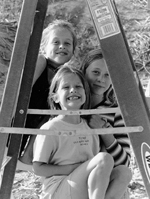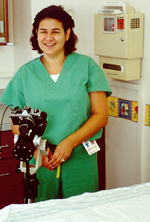From Darkness to Light:protecting sexually abused children
by Dick PetersonPublic Relations
It's a blight on society that thrives under the cover of darkness.
That's why a Charleston-based organization is shining a national spotlight on child sexual abuse. It's a blight that exacts a terrible toll from its young victims; it haunts them in their adult years; it perpetuates itself into the next generation.
From Darkness to Light executive director Anne Lee says the sexual abuse of children that permeates American society today continues to exist only because it remains hidden under a cloak of threat, fear and violence. And when it surfaces, it’s something else—it’s an overwhelming sense of guilt and shame, mental or emotional illness, alcohol and drug abuse, obsessive behavior, and shattered relationships.
And the sexually abused may become sexual abusers themselves.
It's a cycle that needs to be broken, say MUSC's Sara Schuh, M.D., Melisa Holmes, M.D., and Rochelle Hanson, Ph.D. From Darkness to Light plays an important role in that intervention. The program's activities encourage the victims and adult survivors of child sexual abuse to come forward and to seek treatment.
 Three
of the child “extras” mug for the camera during filming of a public service
spot produced by award-winning director Stewart Birbrower.
Three
of the child “extras” mug for the camera during filming of a public service
spot produced by award-winning director Stewart Birbrower.
“Not every child who was abused sexually grows up to be an abuser,” Schuh said. But she added that the abuse often has consequences that the child can carry throughout life. And that can be devastating. Schuh has been treating child abuse and neglect victims and their families for more than 20 years.
“From Darkness to Light began about five years ago as a public forum for adult survivors of child sexual abuse,” Lee said. “Original partners of the project of the Center for Women which grew from a vision and monetary gift from a concerned citizen in our community. We continue the public forum for adult survivors, but have enlarged our vision to include a primary prevention program.”
Today the organization, with an office in the Lowcountry Children's Center, has developed a comprehensive media campaign with a Nov. 15 launch date, raised more than $100,000 for operations, and held 10 community awareness meetings. On the schedule are two workshops and an Oct. 13 conference.
Meanwhile child abuse specialists at MUSC hope that as the cover of sexual abuse is removed, they will not be overwhelmed by the need for treatment.
“For a child who has just been sexually abused, we can offer immediate access to treatment,” Schuh said. When the abuse has been occurring over a period of time or occurred more than three days before it was disclosed, the response is “rapid.”
Schuh and Holmes, who is director of MUSC's Sexual Assault Follow-up Evaluation (SAFE) program, are grateful for the recently opened VIP Suite, an outpatient entry point which can deal with the more immediate clinical, forensic and psychological needs of a child who has been abused or neglected. It also offers access to longer-term therapy and community resources.
“Our goal,” Schuh said, “is to see a patient within 30 minutes or as soon as possible. In acute cases, the victim is seen by a specialist who can perform an examination and collect evidence.” She said that a person with People Against Rape (PAR) is readily available to support the victim through the examination procedure and explain the law enforcement need for evidence.
Inpatient services run the full range, including:
- burn service in pediatric surgery
- neurosurgery caring for head trauma and shaken baby injuries
- Pediatric Intensive Care Unit (PICU) to manage severely injured children
- dermatology
- forensic dentistry
- medical examiner’s office
- OB/GYN
- psychiatry and mental health through the Crime Victims Center
- ophthalmology to treat retinal hemorrhage in a baby who has been shaken
- pediatric orthopaedics
- and pediatric radiology.
“Many women come in with vague complaints, hoping the doctor will identify the source of their problem without their having to say it,” Holmes said. “We've created in the SAFE Clinic a place where teen and adult victims of sexual assault can feel safe to disclose past experiences and be given a physical exam, a mental health assessment and receive advocacy support from People Against Rape.”
The behavior problems and psychological symptoms that can occur as a result of sexual abuse are Hanson's concern. As a clinical psychologist with MUSC's National Crime Victims Treatment and Research Center, she helps with the treatment of victims and reunification of families when possible.
“Trauma in general often results in anxiety, post traumatic stress, depression and behavior problems,” Hanson said. While sexual abuse is certainly traumatic, she also sees victims of physical abuse, violence, and natural disasters.
“Child victims behave differently than adults,” Hanson said. “They can have a difficult time talking about their abuse and may have behavior or emotional problems because of their experiences. These problems can include sleep disturbance, nightmares, hyperactivity stemming from anxiety, and a lot of fear. For some kids, symptoms may not be obvious or readily observed.”
Hanson said that educational efforts thus far have focused on what children can do, like know the difference between a “bad” touch and a “good” touch and how to tell someone when they are molested. It tells them what to do. Incredibly, even when children tell, adults don’t always listen.
“From Darkness to Light shifts the burden of protecting children to adults,” she said.
To Lee, it's an uphill battle, but a battle that has to be fought.
She and the organization’s board of directors are heartened by the success of Mothers Against Driving Drunk (MADD). In less than 30 years MADD was able to swing public opinion on driving and drinking from a that's-just-the-way-it-is toleration to an inexcusable crime.
And From Darkness to Light has Stewart Birbrower. The award-winning director has created four highly compelling 30-second public service spots that promise an in-your-face public confrontation with the horrific cruelty of child sexual abuse. One of them portrays the childhood innocence of a young girl in a white dress on a swing. As the message speaks, the camera pans. Purity and innocence evaporate as it becomes evident the girl has been impregnated.
Another illustrates that an estimated one in 10 victims of child sexual abuse ever tell anyone. A crowd of children on a beach is digitally multiplied to represent the 1,000 children in Charleston who were counseled for abuse last year. From Darkness to Light asks, “Are we to believe that 10,000 children in Charleston suffered last year?”
As a research center, the Crime Victims Center will be tracking public response.
“When the TV spots are aired in November, we’ll be conducting community evaluations with pre-post questionnaires,” Hanson said. “We’ll also monitor the number of phone calls and the number of hits on the From Darkness to Light Web site, and we’ll conduct focus groups to determine which of the four spots connect best with viewers.
“They get to the point, their catchy—a little sensational—but high quality and designed to increase community awareness.”
From Darkness to Light has partially funded, along with an educational grant from the Humanitias Foundation, its first child sexual abuse liaison to serve as a resource for teachers in 80 Charleston-area schools. Forty percent of the abused children who tell an adult, tell a teacher, Lee said. The teachers need to know what to do when a child discloses.
“I want people to see child sexual abuse for the core issue it is,” Lee said. “I want children to know that when they tell, an adult will listen. I want adults to know that the child sexual abuse going on in their homes, their neighborhoods, their communities is not something to be ignored. It doesn’t just go away. They don’t just get over it.”
When millions of dollars go to fight the war on drugs, or to not let friends drive drunk, or to take a bite out of crime, or when 51 percent of U.S. marriages end in divorce, society pays. But the payments are treating symptoms, while ignoring the disease. The child sexual and physical abuse behind society's ills is the core issue and it's overwhelming, Lee says.
The fourth annual From Darkness to Light conference is scheduled for Oct. 13 at The Charleston Music Hall. The conference will include presentations from former Miss America and sexual abuse survivor Marilyn Van Derbur, speaking on Myths Surrounding Child Sexual Abuse; from John Lee, a leader in personal growth, relationships and recovery, speaking on Anger—A Hallmark of Abuse; How to Deal with It; and Tom Reed, Ph.D., associate professor of education at the University of South Carolina, speaking on How to Deal with Children from Abusive and Neglective Homes.
MUSC Office of Public Relations director Sarah King has been named this year's conference chairwoman. The Center for Women, Lowcountry Children’s Center, People Against Rape and Trident United Way are sponsors for the 2000 conference.
Did you Know?
- One in three girls will be sexually abused before the age of 18.
- One in six boys will be sexually abused before the age of 18.
- Less than one in ten of these children will report the abuse.
- Most of these children will carry forever the emotional scars and guilt of abuse. A large percentage of adult survivors will experience alcohol and drug problems, as well as mental disorders—and many will sexually abuse others.
A child brought to the ER time after time
should raise questions. But repeat visits, a good reason
to suspect child abuse, go unnoticed all too often.
Not so at MUSC.
“We keep tabs on them,” said VIP Center nurse Charlene Dimond.
In January, the Violence Intervention and Prevention Center at MUSC opened its doors and arms to children whose plight in violent and abusive circumstances will no longer be ignored.
 VIP
Center nurse Charlene Dimond demonstrates use of the center’s colposcope,
a specially equipped camera designed to photograph evidence of physical
abuse of children. The center, which has a waiting room with child-sized
furniture and toys, also keeps replacement clothing to give to children
whose clothes have to be retained for evidence.
VIP
Center nurse Charlene Dimond demonstrates use of the center’s colposcope,
a specially equipped camera designed to photograph evidence of physical
abuse of children. The center, which has a waiting room with child-sized
furniture and toys, also keeps replacement clothing to give to children
whose clothes have to be retained for evidence.
The center is staffed and equipped to examine children for injuries and diseases and to arrange for therapy. Dimond has seen them from 4 months of age to 17 years. They are equipped to take close-up, magnified photos of injuries, videotape interviews on request and collect other evidence, such as specimens and clothing.
And they keep a database on the condition and follow-up of each child. There have been more than 200 since January.
“We take a case management approach here,” Dimond said. “If another nurse does the exam, I process the paperwork and send it to police officials and the Department of Social Services.”
She said the center maintains communication with detectives who call to discuss the significance of certain injuries, what they mean and how they were inflicted. “And we follow up with DSS to keep current with the cases.”
Children suspected of being sexually or physically abused or neglected come to the center from all over the state. Center staff check and keep track of which county they are from and where the incident occurred, the police and DSS caseworker involved, evidence found, lab work and results, follow-up appointments and prior hospitalizations.
“Before they would walk into an emergency room and that was it.”